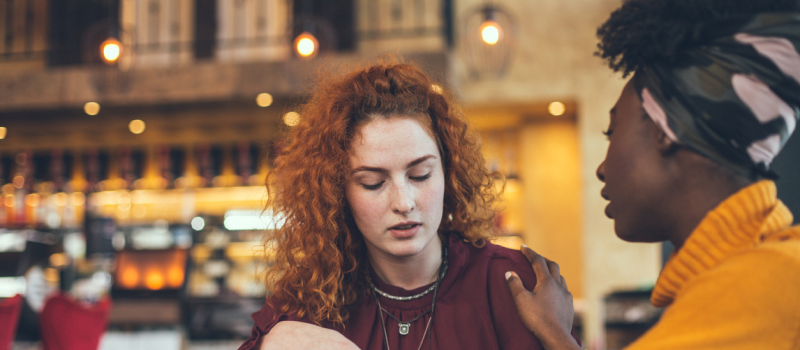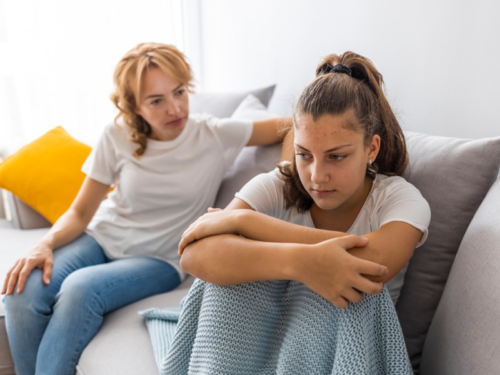
Table of Contents
Yes, Friendship Breakups Really Hurt—Here’s How to Heal
Written By: Charlie Health Editorial Team

Clinically Reviewed By: Sarah Lyter
June 4, 2024
5 min.
Understanding why friendship breakups happen and how they may affect you can help you cope with the loss, heal emotionally, and learn valuable lessons.
Learn more about our Clinical Review Process
Table of Contents
A friendship breakup is the end of a close relationship between friends — and it can be as emotionally challenging as a romantic breakup. Due to the loss of the bond and support the friendship provided, a friendship breakup involves a range of emotions, such as sadness, anger, and grief.
Healing from a friendship breakup involves acknowledging and processing emotions, reflecting on what happened, seeking support from others, and gradually moving on to form a new friendship. Below, we will delve into the causes of a friendship breakup, ways to move on, and how to communicate effectively throughout.
Join the Charlie Health Library
Get mental health updates, research, insights, and resources directly to your inbox.
You can unsubscribe anytime.
What causes a friendship breakup?
Friendship breakups can occur due to a variety of reasons, often rooted in changes in personal circumstances, communication breakdowns, or shifts in compatibility. Here are some common causes:
- Poor communication
- Changing interests and lifestyles
- Betrayal or breach of trust
- Unbalanced effort
- Life transitions
- Conflicting values or beliefs
- Toxic behavior
- Lack of mutual support
- Competition and jealousy
- Neglect and inattention
- Personal growth and self-discovery
Recognizing these causes can help people understand the dynamics of friendship breakups and offer insight into how to address or prevent them. However, sometimes, despite best efforts, friendships may end, and it's important to navigate these endings with compassion and respect for the time and experiences shared.
How to get over a friendship breakup
Getting over a friendship breakup can be challenging, but there are several steps you can take to heal and move forward. By taking care of yourself and seeking emotional support, you can heal and eventually open up to new, fulfilling relationships. Here are some strategies to help you through the process:
Allow yourself time to grieve
Acknowledge your feelings and allow yourself to process the loss of a friendship. It's normal to feel sad, angry, or confused after a close friendship ends.
Seek support
Seek emotional support from another friend, a family member, or a mental health professional. Sharing your thoughts with supportive people can provide comfort and perspective.
Focus on self-care
Engage in activities that make you feel good and help you relax. Exercise, hobbies, and self-care routines can boost your mood and help you regain a sense of normalcy.
Limit contact
Give yourself some distance from your former friend, at least initially. This can help you process your emotions without the added stress of interacting with them.
Set boundaries with mutual friends
If you continue to interact with mutual friends, set clear, healthy boundaries to avoid uncomfortable situations or conversations about the breakup.
Stay open to new friendships
While it may be difficult, try to stay open to making future friendships. Meeting a new friend can bring fresh perspectives and help you move on.
Is it normal to feel sad after a friendship breakup?
Yes, it is completely normal to feel sad after a friendship breakup. Friendships are important parts of our lives, offering support, companionship, and belonging. When a friendship ends, it can feel like a significant loss, similar to a romantic breakup, research shows. The emotional bonds we form with friends are deep, and losing a close friend can leave a void where that support and connection once were. This loss is especially painful because it involves shared memories and experiences that shape our identity.
The end of a close friendship can disrupt your daily routines. Friends often play a key role in these patterns, and losing one can make you feel unstable or lonely. This disruption is worsened by losing the trust and intimacy friendships provide. It can feel like a betrayal or losing a confidant, leading to sadness and isolation. These feelings are valid and a natural response to losing a close relationship.
Also, friendships can influence how you see yourself, and their loss can make you question your self-worth or lead to self-doubt. This can contribute to feelings of sadness as you navigate the changes in your social and emotional life. Friends often serve as a crucial support system during tough times, and losing that support can make you feel vulnerable and alone. Acknowledging these feelings and allowing yourself to grieve is an important part of the healing process.

How to communicate effectively during a friendship breakup
Communicating effectively during a friendship breakup can help ensure that both parties understand each other and can part ways with respect. If you’re initiating a friendship breakup, here are some tips to help you navigate this difficult conversation:
Choose the right time and place
Have the conversation in a private, comfortable setting where you won't be interrupted. Avoid discussing it when either of you is stressed or distracted.
Be honest but kind
Speak truthfully about your feelings and the reasons for the breakup, but do so with kindness and sensitivity. Avoid blaming or attacking the other person.
Use "I" statements
Frame your feelings and perspectives using "I" statements to avoid sounding accusatory. For example, say, "I feel that we have grown apart" instead of "You have changed."
Stay calm and composed
Keep your emotions in check and remain calm, even if the conversation becomes difficult. If you feel overwhelmed, take a moment to breathe and gather your thoughts.
Be prepared for various reactions
Understand that your friend might react with sadness, anger, or denial. Be empathetic and give them space to process their emotions.
Seek closure
Aim to leave the conversation with a sense of closure. Summarize what was discussed and make sure both of you understand the outcome and any future expectations.

How Charlie Health can help
If you or a loved one are struggling with mental health, Charlie Health is here to help. Charlie Health’s virtual Intensive Outpatient Program (IOP) provides more than once-weekly mental health treatment for young people and families dealing with serious mental health conditions. Our expert clinicians incorporate evidence-based therapies into individual counseling, family therapy, and group sessions. With this kind of holistic treatment, managing your mental health is possible. Fill out the form below or give us a call to start healing today.





